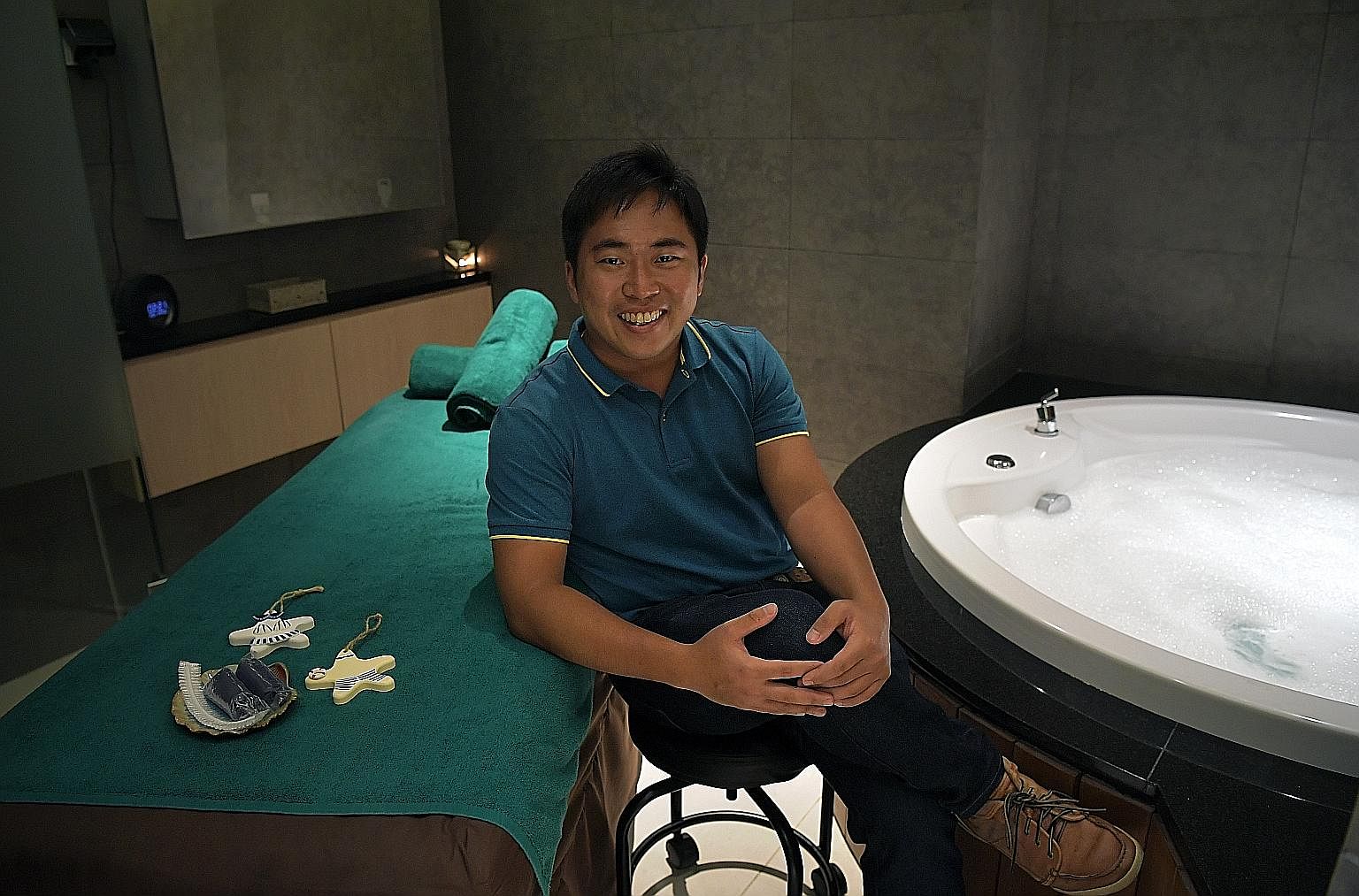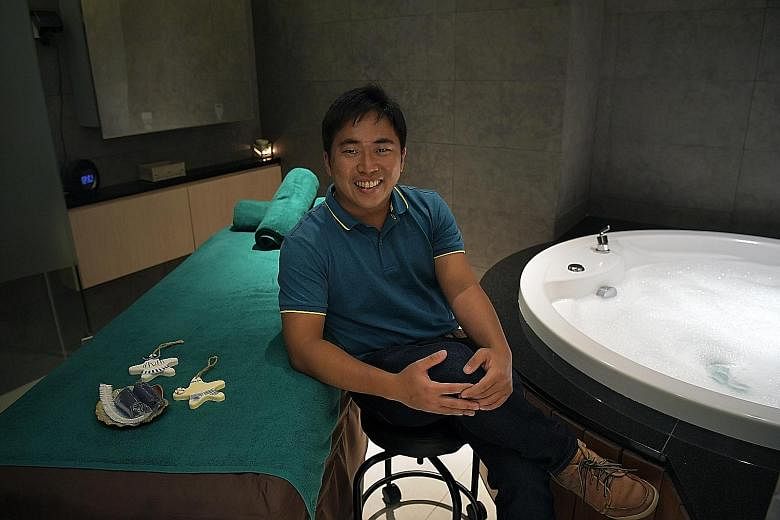In some ways, business is a way of proving that mathematics works, and that is exactly why maths geek Ting Wei Lin became a businessman.
Mr Ting, 29, realised the importance of starting young when it comes to growing wealth, through the future value formula - commonly used in finance - that he stumbled upon at 19.
The former maths teacher said: "My only regret was not starting earlier. In the calculation of future value, the most powerful variable is the number of years which wealth is allowed to compound at."
The Nanyang Technological University maths major who specialised in statistics said his love for the subject started early - in primary school, he was in the Maths Olympiad programme. He now spends most of his time crunching numbers for several co-owned businesses.

One way he picks them is by keeping an ear close to the ground. "I spend a significant amount of time scuttlebutting - an old sailor slang term which means talking to people on the ground, such as customers, suppliers, employees and more. I believe that the qualitative aspects of business should not be neglected and these intangibles should be factored in when valuing a business."
Q Moneywise, what were your growing-up years like?
A I grew up in a simple and happy middle-class family. My parents always reminded me about the difference between a need and a want.
When I was in secondary school, my parents gave me pocket money on a monthly basis. In college, they decided to give my allowance on an annual basis.
This was not common among my classmates and it was only later on in life that I understood my parents' intention. In a subtle manner, they were teaching me how to delay gratification and to plan ahead in life, in terms of budgeting and goal setting.
It was not an easy task at the beginning, given the various distractions available to a teenager, from bubble tea to tech gadgets, and especially so when I was given access to lump sums.
Q How did you get interested in investing?
A As a teenager, I got interested in investing - stocks of public businesses first, then private businesses - as an intellectual pursuit. It was fun for me because it presented a highly complex maths problem, which involved multiple variables.
Basically, I did the maths. I projected what the net worth of an average individual in Singapore would be and whether it would be sufficient for retirement.
The assumptions were made based on his starting income, income growth rate, average expenditure, life expectancy and inflation rates based on national averages.
I also studied the Central Provident Fund policy and projected how the minimum sum would increase over the next 20 years based on past data.
-
Worst and best bets
-
Q What has been your biggest investing mistake?
A My investment in Nokia in 2008 - a loss in the thousands. In hindsight, I've learnt that I am not good at investing in turnaround plays.
Nokia was going through massive restructuring back then, taking a hit from the smartphone makers. Thinking that I was getting good value on my stock purchase, I bought the stock despite falling earnings and, eventually, the earnings became negative.
Soon after, I sold the stock and booked in my loss.
Q And what has been your best investment move?
A One of my best investments is First Reit, which I am still holding today. I first bought it about eight years ago and again a few years ago.
My average cost is about 78 cents, which represents a yield of about 10.9 per cent, based on the 2016 financial year's distribution per unit of 8.47 cents.
Rachael Boon
The simple conclusion was investing is a necessity and that most people should get started earlier, rather than later.
Q Describe your investing strategy.
A Value and growth - I believe that value and growth are joined at the hip, meaning that one can find value in growth and, similarly, an investment that seems like a value bet might also entail growth potential depending on which phase of the business cycle we are at.
I don't believe in technical charts. Price and volume are poor indications of value.
I believe in fundamental methods, such as studying the key financial ratios and data of the business - such as free cashflow, price-earnings and liquidity - what is its economic moat relative to competitors and observing macro trends in the industry. I also like to focus on industries I can understand, such as food and beverage (F&B), fast-moving consumer goods and healthcare.
Q What's in your portfolio?
A My investments consist of private businesses in Singapore and public businesses listed in the United States and on the Singapore Exchange. The combined worth is in the seven-digit range. I get a five-digit passive income from dividends each month.
I've co-invested and am a director at international franchise Anytime Fitness at Kallang Wave, local fast-casual F&B franchise Greendot at Westgate - which has been operating for less than a year and the revenue has crossed seven digits - and Caribbean Spa at Capri by Fraser, a "business-class spa".
I like the freedom of business which gives my hours flexibility. In university, I even joined the Queen's Entrepreneurs' Competition, a major Canadian business case competition.
Q What does money mean to you?
A Money, like power, if used appropriately, can be used to improve lives. On one of my (community) service learning trips to the Philippines in university, I learnt it costs around US$120,000 (S$170,000) to build a whole community of houses which can be used to provide shelter and electricity for the homeless.
I'm planning to go on one such trip in June with a couple of friends and it'll require $5,000 to $10,000, where we take along donated items and assess what they need.
Yes, we can derive happiness from the purchase of goods and services which are material, but another way to find long-term, sustainable happiness is to give and to love.
Q What's the most extravagant thing you have done?
A Travelling extensively to different parts of the world, including the US, Canada, South America, Europe and Asia. I estimate that I've spent at least $70,000 since I was 22.
Q What are your immediate investment plans?
A To invest in another F&B venture in the second half of the year, and that'll likely be a six-digit sum.
Q How are you planning for retirement?
A By continuing to fine-tune my current investments and perhaps doing more business ventures.
My passive income is already more than what is required for my lifestyle.
Q Home is now...
A A five-room flat in the east with dad, mum and my younger sister.
Q I drive...
A I don't. The cost of keeping my eyes on the road, occupying both time and attention, far exceeds the benefit of having the sense of freedom. With Uber these days, I can travel to wherever I like and enjoy a book along the way.


